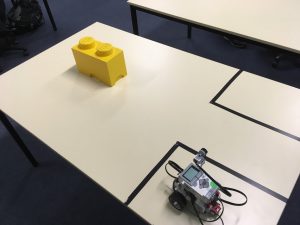
This challenge is great for raising the importance of reliability and repeatability in robotics, and in engineering more generally.
The challenge
Program your robot to run an obstacle course in the fastest time, reliably.
Teacher notes
For the last couple of years, I’ve used this challenge to highlight the pros and cons of autonomous v remote control.
Accordingly, I gave my students the choice of whether to make their robot run the course by itself (i.e. autonomous), controlled by a human (i.e. remote control), or some combination of the two.
I gave them the following additional constraints to keep it interesting:
- Autonomous – Dead reckoning is not an option for this challenge, you must use sensors to navigate through the course. If necessary, I will reposition the robot in the starting area.
- Remote control – This is a DIY remote control challenge. Third party remote control is not an option – i.e. no phone apps.
The last time I ran this I made the course deliberately simple, but ensured there were some opportunities for using sensors if they chose to go with an autonomous approach. The robots were required to drive around a box (that could potentially be detected by an ultrasonic sensor) and back to the finish area.
For the teams attempting the remote control approach, I provided some long 70cm and 90cm cables (available here) so they could, for example, make a controller using touch sensors. Some teams researched EV3-to-EV3 Bluetooth messaging and made their own remote control using a second EV3 brick.
Interestingly, there wasn’t much difference between the times recorded for the fastest autonomous and fastest remote-controlled solutions.
Here are some of some of the results…
Autonomous with a light sensor:
Autonomous with an ultrasonic sensor:
Remote control:
Rob Torok
Latest posts by Rob Torok (see all)
- Obstacle Course - 26 August 2020
- Crash Test Dummy - 26 August 2020
- The Wave - 21 May 2020
- Build X - 20 May 2020
- Build a Duck - 20 May 2020